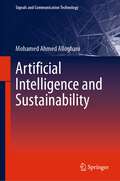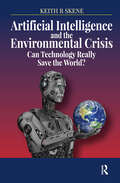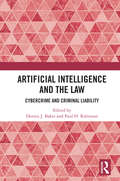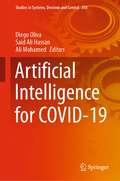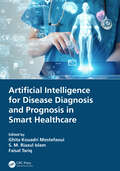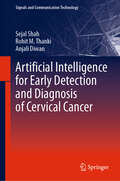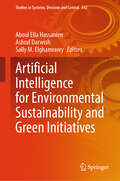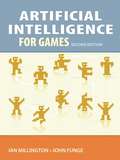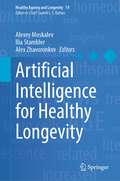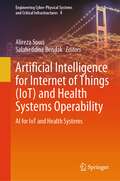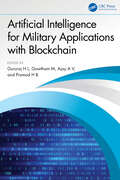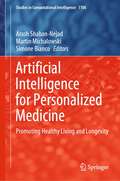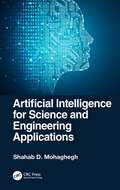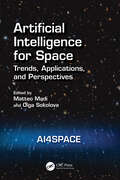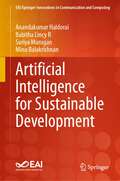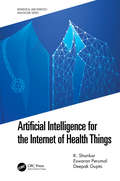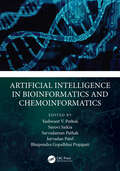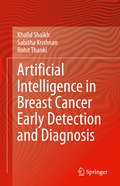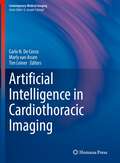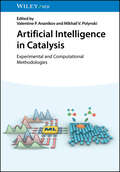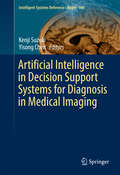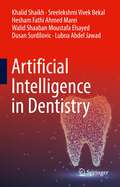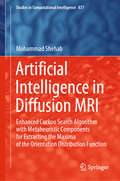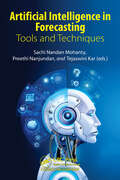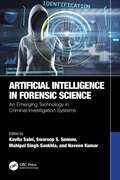- Table View
- List View
Artificial Intelligence and Sustainability (Signals and Communication Technology)
by Mohamed Ahmed AlloghaniThis book gives readers the tools to craft AI systems that don't just thrive today, but endure sustainably into the future. Whether a trailblazer or an aspiring innovator, this book enables readers to resonate with the ambitions of software developers, data scientists, and AI practitioners. The author covers the latest techniques and best practices for energy efficiency, reducing carbon footprints, and ensuring fair and ethical AI. The book also addresses important issues such as AI governance, managing risks, and ensuring transparency. Topics covered include understanding the relationship between AI and sustainable development, strategies for building efficient AI systems, and ethical considerations in AI development, among others. The author includes case studies of companies and organizations that have successfully implemented sustainable AI software development practices. Therefore, this book will be of interest to AI practitioners, academics, researchers, and lecturers in computer science, artificial intelligence, machine learning and data sciences.
Artificial Intelligence and the Environmental Crisis: Can Technology Really Save the World?
by Keith Ronald SkeneA radical and challenging book which argues that artificial intelligence needs a completely different set of foundations, based on ecological intelligence rather than human intelligence, if it is to deliver on the promise of a better world. This can usher in the greatest transformation in human history, an age of re-integration. Our very existence is dependent upon our context within the Earth System, and so, surely, artificial intelligence must also be grounded within this context, embracing emergence, interconnectedness and real-time feedback. We discover many positive outcomes across the societal, economic and environmental arenas and discuss how this transformation can be delivered.Key Features: Identifies a key weakness in current AI thinking, that threatens any hope of a better world. Highlights the importance of realizing that systems theory is an essential foundation for any technology that hopes to positively transform our world. Emphasizes the need for a radical new approach to AI, based on ecological systems. Explains why ecosystem intelligence, not human intelligence, offers the best framework for AI. Examines how this new approach will impact on the three arenas of society, environment and economics, ushering in a new age of re-integration.
Artificial Intelligence and the Law: Cybercrime and Criminal Liability
by Dennis J. Baker Paul H. RobinsonThis volume presents new research in artificial intelligence (AI) and Law with special reference to criminal justice. It brings together leading international experts including computer scientists, lawyers, judges and cyber-psychologists. The book examines some of the core problems that technology raises for criminal law ranging from privacy and data protection, to cyber-warfare, through to the theft of virtual property. Focusing on the West and China, the work considers the issue of AI and the Law in a comparative context presenting the research from a cross-jurisdictional and cross-disciplinary approach. As China becomes a global leader in AI and technology, the book provides an essential in-depth understanding of domestic laws in both Western jurisdictions and China on criminal liability for cybercrime. As such, it will be a valuable resource for academics and researchers working in the areas of AI, technology and criminal justice.
Artificial Intelligence for COVID-19 (Studies in Systems, Decision and Control #358)
by Diego Oliva Said Ali Hassan Ali MohamedThis book presents a compilation of the most recent implementation of artificial intelligence methods for solving different problems generated by the COVID-19. The problems addressed came from different fields and not only from medicine. The information contained in the book explores different areas of machine and deep learning, advanced image processing, computational intelligence, IoT, robotics and automation, optimization, mathematical modeling, neural networks, information technology, big data, data processing, data mining, and likewise. Moreover, the chapters include the theory and methodologies used to provide an overview of applying these tools to the useful contribution to help to face the emerging disaster. The book is primarily intended for researchers, decision makers, practitioners, and readers interested in these subject matters. The book is useful also as rich case studies and project proposals for postgraduate courses in those specializations.
Artificial Intelligence for Disease Diagnosis and Prognosis in Smart Healthcare
by Faisal Tariq Ghita Kouadri Mostefaoui Islam, S. M. RiazulArtificial Intelligence (AI) in general and machine learning (ML) and deep learning (DL) in particular and related digital technologies are a couple of fledging paradigms that next-generation healthcare services are sprinting towards. These digital technologies can transform various aspects of healthcare, leveraging advances in computing and communication power. With a new spectrum of business opportunities, AI-powered healthcare services will improve the lives of patients, their families, and societies. However, the application of AI in the healthcare field requires special attention given the direct implication with human life and well-being. Rapid progress in AI leads to the possibility of exploiting healthcare data for designing practical tools for automated diagnosis of chronic diseases such as dementia and diabetes. This book highlights the current research trends in applying AI models in various disease diagnoses and prognoses to provide enhanced healthcare solutions. The primary audience of the book are postgraduate students and researchers in the broad domain of healthcare technologies. Features In-depth coverage of the role of AI in smart healthcare Research guidelines for AI and data science researchers/practitioners interested in the healthcare sector Comprehensive coverage on security and privacy issues for AI in smart healthcare
Artificial Intelligence for Early Detection and Diagnosis of Cervical Cancer (Signals and Communication Technology)
by Rohit M. Thanki Sejal Shah Anjali DiwanThis book introduces the revolutionary use of AI in the field of cervical cancer detection. The book explores how advanced computer algorithms can analyze medical images and patient data to enhance early detection and accurate diagnosis of cervical cancer. The book starts by providing a comprehensive overview of cervical cancer, its risk factors, and the importance of early detection. It then delves into the fundamental concepts of artificial intelligence and its application in healthcare. Readers will gain a deeper understanding of how AI algorithms can "see" patterns in cervical cells and tissue, enabling the detection of abnormal cells and precancerous changes that may indicate the presence of cervical cancer. Drawing on the latest research and real-world case studies, the book showcases the various AI techniques used for cervical cancer screening, including the analysis of Pap smear and liquid-based cytology images. This book is an essential read for healthcare professionals, researchers, policymakers, and anyone interested in the intersection of AI and healthcare.
Artificial Intelligence for Environmental Sustainability and Green Initiatives (Studies in Systems, Decision and Control #542)
by Ashraf Darwish Aboul Ella Hassanien Sally M. ElghamrawyThis book discusses AI's applications in sustainability, exploring its potential in sectors such as energy, healthcare, agriculture, transportation, and waste management. Discusses applications and innovations in Green Initiatives such as energy, finance, and drug discovery. Highlights the ethical challenges and benefits of integrating AI into sustainability initiatives
Artificial Intelligence for Games
by Ian Millington John FungeCreating robust artificial intelligence is one of the greatest challenges for game developers, yet the commercial success of a game is often dependent upon the quality of the AI. In this book, Ian Millington brings extensive professional experience to the problem of improving the quality of AI in games. He describes numerous examples from real games and explores the underlying ideas through detailed case studies. He goes further to introduce many techniques little used by developers today. The book's associated web site contains a library of C++ source code and demonstration programs, and a complete commercial source code library of AI algorithms and techniques. "Artificial Intelligence for Games - 2nd edition" will be highly useful to academics teaching courses on game AI, in that it includes exercises with each chapter. It will also include new and expanded coverage of the following: AI-oriented gameplay; Behavior driven AI; Casual games (puzzle games).
Artificial Intelligence for Healthy Longevity (Healthy Ageing and Longevity #19)
by Alexey Moskalev Ilia Stambler Alex ZhavoronkovThis book reviews the state-of-the-art efforts to apply machine learning and AI methods for healthy aging and longevity research, diagnosis, and therapy development. The book examines the methods of machine learning and their application in the analysis of big medical data, medical images, the creation of algorithms for assessing biological age, and effectiveness of geroprotective medications.The promises and challenges of using AI to help achieve healthy longevity for the population are manifold. This volume, written by world-leading experts working at the intersection of AI and aging, provides a unique synergy of these two highly prominent fields and aims to create a balanced and comprehensive overview of the application methodology that can help achieve healthy longevity for the population.The book is accessible and valuable for specialists in AI and longevity research, as well as a wide readership, including gerontologists, geriatricians, medical specialists, and students from diverse fields, basic scientists, public and private research entities, and policy makers interested in potential intervention in degenerative aging processes using advanced computational tools.
Artificial Intelligence for Internet of Things: AI for IoT and Health Systems (Engineering Cyber-Physical Systems and Critical Infrastructures #8)
by Alireza Souri Salaheddine BendakIoTHIC-2023 is a multidisciplinary, peer-reviewed international conference on Internet of Things (IoT) and healthcare systems with Artificial Intelligence (AI) techniques such as data mining, machine learning, image processing, and meta-heuristic algorithms. The AI-based techniques are applied on many fields of healthcare systems, including predicting and detecting diseases in hospitals, clinics, smart health monitoring systems, surgery, medical services, and etc.
Artificial Intelligence for Military Applications with Blockchain
by Gowtham M Gururaj H L Ajay A V Pramod H BIn an era where advanced technology plays a critical role in maintaining national security, Artificial Intelligence for Military Applications with Blockchain investigates how combining AI and blockchain could transform military operations. This comprehensive guide offers creative answers for contemporary military problems while addressing the most important defense-related concerns, from data security to decision-making.It explores constrained networking middleware for defense applications, guaranteeing smooth communication under critical circumstances. This book starts with an in-depth examination of blockchain’s potential to improve document management across defense departments, then moves to a detailed discussion of security and privacy in military applications. The integration of AI and blockchain in military context is then the main topic of discussion, along with its advantages, disadvantages, and real-time applications.The potential of blockchain and AI to protect data and streamline operations is also explored, providing readers with insights into the military and healthcare sectors. This book offers a thorough examination of the military’s current and future use of AI, as well as a breakdown of cybersecurity issues and how blockchain technology is being used to improve military cybersecurity. A dedicated chapter examines the ways in which blockchain technology is being used by computational intelligence to transform the defense environment.Key features: Examines privacy and security issues in military blockchain applications Investigates military operations using constrained networking middleware Discusses integrating AI and blockchain technology for military applications Includes case studies of blockchain and AI uses in the military and healthcare Thoroughly examines cybersecurity issues and how blockchain technology can help This book is essential for military personnel, defense academics, and cybersecurity specialists interested in the use of AI and blockchain for defense. It presents real-world examples and case studies together with an outlook on how these technologies will influence future military operations.
Artificial Intelligence for Personalized Medicine: Promoting Healthy Living and Longevity (Studies in Computational Intelligence #1106)
by Simone Bianco Arash Shaban-Nejad Martin MichalowskiThis book aims to highlight the latest achievements in the use of AI in personalized medicine and healthcare delivery. The edited book contains selected papers presented at the 2023 Health Intelligence workshop, co-located with the Thirty-Seven Association for the Advancement of Artificial Intelligence (AAAI) conference, and presents an overview of the issues, challenges, and potentials in the field, along with new research results. This book provides information for researchers, students, industry professionals, clinicians, and public health agencies interested in the applications of AI in medicine and public health.
Artificial Intelligence for Science and Engineering Applications
by Shahab D. MohagheghArtificial Intelligence (AI) is defined as the simulation of human intelligence through the mimicking of the human brain for analysis, modeling, and decision‑making. Science and engineering problem solving requires modeling of physical phenomena, and humans approach the solution of scientific and engineering problems differently from other problems. Artificial Intelligence for Science and Engineering Applications addresses the unique differences in how AI should be developed and used in science and engineering. Through the inclusion of definitions and detailed examples, this book describes the actual and realistic requirements as well as what characteristics must be avoided for correct and successful science and engineering applications of AI.This book:• Offers a brief history of AI and covers science and engineering applications• Explores the modeling of physical phenomena using AI• Discusses explainable AI (XAI) applications• Covers the ethics of AI in science and engineering• Features real‑world case studiesOffering a probing view into the unique nature of scientific and engineering exploration, this book will be of interest to generalists and experts looking to expand their understanding of how AI can better tackle and advance technology and developments in scientific and engineering disciplines.
Artificial Intelligence for Space: Trends, Applications, and Perspectives
by Matteo Madi Olga SokolovaThe new age space value chain is a complex interconnected system with diverse actors, which involves cross-sector and cross-border collaborations. This book helps to enrich the knowledge of Artificial Intelligence (AI) across the value chain in the space-related domains. Advancements of AI and Machine Learning have impactfully supported the space sector transformation as it is shown in the book. "This book embarks on a journey through the fascinating realm of AI in space, exploring its profound implications, emerging trends, and transformative potential." Prof. mult. Dr.med. Dr.rer.nat. Oliver UllrichDirector Innovation Cluster Space and Aviaton (UZH Space Hub), University of Zurich, Switzerland Aimed at space engineers, risk analysts, policy makers, technical experts and non-specialists, this book demonstrates insights into the implementation of AI in the space sector, alongside its limitations and use-case examples. It covers diverse AI-related topics applicable to space technologies or space big data such as AI-based technologies for improving Earth Observation big data, AI for space robotics exploration, AI for astrophysics, AI for emerging in-orbit servicing market, and AI for space tourism safety improvement. Key Features: Provides an interdisciplinary approach, with chapter contributions from expert teams working in the governmental or private space sectors, with valuable contributions from computer scientists and legal experts; Presents insights into AI implementation and how to unlock AI technologies in the field; Up to date with the latest developments and cutting-edge applications Matteo Madi, Ph.D., is an entrepreneur, innovator, business developer and space-tech specialist with many years of experiences in the Swiss and International public and private sectors. He is the founder of Sirin Orbital Systems AG, a Swiss innovative company based in Zurich, focused on the development and commercialization of advanced enabling technologies for the needs of emerging space market and future sustainable space exploration. It also creates innovative solutions for the use of space technologies and satellite-based services for terrestrial applications. Olga Sokolova, Ph.D., is a risk analyst proficient in critical infrastructure risk assessment to natural and technical hazards. She has been engaged in development and analysis of structural risk-management tools towards sustainable future and has a record in raising social awareness of spaceborne risks and opportunities brought to the society by the "New Space" industry developments. Along with Dr. M. Madi, Dr. O. Sokolova is the Co-Editor of the book entitled, "Space Debris Peril: Pathways to Opportunities", published by CRC Press: Taylor and Francis in November 2020 (ISBN 9780367469450).
Artificial Intelligence for Sustainable Development (EAI/Springer Innovations in Communication and Computing)
by Anandakumar Haldorai Suriya Murugan Babitha Lincy R Minu BalakrishnanThis book delves into the synergy between AI and sustainability. This comprehensive guide illuminates the latest trends and cutting-edge techniques, offering invaluable insights for researchers, practitioners, and policymakers interested in the cross-section of AI and sustainability. The authors illustrate how AI-driven innovations are revolutionizing environmental conservation, urban planning, healthcare, and more. The book also considers the ethical considerations and governance frameworks crucial to harnessing AI's potential for global benefit. Whether a seasoned expert or a curious newcomer, this book empowers readers to navigate the dynamic landscape of AI and sustainability, paving the way for a more eco-conscious and equitable world.
Artificial Intelligence for the Internet of Health Things (Biomedical and Robotics Healthcare)
by Deepak Gupta K. Shankar Eswaran PerumalThis book discusses research in Artificial Intelligence for the Internet of Health Things. It investigates and explores the possible applications of machine learning, deep learning, soft computing, and evolutionary computing techniques in design, implementation, and optimization of challenging healthcare solutions. This book features a wide range of topics such as AI techniques, IoT, cloud, wearables, and secured data transmission. Written for a broad audience, this book will be useful for clinicians, health professionals, engineers, technology developers, IT consultants, researchers, and students interested in the AI-based healthcare applications. Provides a deeper understanding of key AI algorithms and their use and implementation within the wider healthcare sector Explores different disease diagnosis models using machine learning, deep learning, healthcare data analysis, including machine learning, and data mining and soft computing algorithms Discusses detailed IoT, wearables, and cloud-based disease diagnosis model for intelligent systems and healthcare Reviews different applications and challenges across the design, implementation, and management of intelligent systems and healthcare data networks Introduces a new applications and case studies across all areas of AI in healthcare data K. Shankar (Member, IEEE) is a Postdoctoral Fellow of the Department of Computer Applications, Alagappa University, Karaikudi, India. Eswaran Perumal is an Assistant Professor of the Department of Computer Applications, Alagappa University, Karaikudi, India. Dr. Deepak Gupta is an Assistant Professor of the Department Computer Science & Engineering, Maharaja Agrasen Institute of Technology (GGSIPU), Delhi, India.
Artificial Intelligence in Bioinformatics and Chemoinformatics
by Yashwant V. PathakThe authors aim to shed light on the practicality of using machine learning in finding complex chemoinformatics and bioinformatics applications as well as identifiying AI in biological and chemical data points. The chapters are designed in such a way that they highlight the important role of AI in chemistry and bioinformatics particularly for the classification of diseases, selection of features and compounds, dimensionality reduction and more. In addition, they assist in the organization and optimal use of data points generated from experiments performed using AI techniques. This volume discusses the development of automated tools and techniques to aid in research plans. Features Covers AI applications in bioinformatics and chemoinformatics Demystifies the involvement of AI in generating biological and chemical data Provides an Introduction to basic and advanced chemoinformatics computational tools Presents a chemical biology based toolset for artificial intelligence usage in drug design Discusses computational methods in cancer, genome mapping, and stem cell research
Artificial Intelligence in Breast Cancer Early Detection and Diagnosis
by Rohit Thanki Khalid Shaikh Sabitha KrishnanThis book provides an introduction to next generation smart screening technology for medical image analysis that combines artificial intelligence (AI) techniques with digital screening to develop innovative methods for detecting breast cancer. The authors begin with a discussion of breast cancer, its characteristics and symptoms, and the importance of early screening.They then provide insight on the role of artificial intelligence in global healthcare, screening methods for breast cancer using mammogram, ultrasound, and thermogram images, and the potential benefits of using AI-based systems for clinical screening to more accurately detect, diagnose, and treat breast cancer.Discusses various existing screening methods for breast cancerPresents deep information on artificial intelligence-based screening methods Discusses cancer treatment based on geographical differences and cultural characteristics
Artificial Intelligence in Cardiothoracic Imaging (Contemporary Medical Imaging)
by Carlo N. De Cecco Marly Van Assen Tim LeinerThis book provides an overview of current and potential applications of artificial intelligence (AI) for cardiothoracic imaging. Most AI systems used in medical imaging are data-driven and based on supervised machine learning. Clinicians and AI specialists can contribute to the development of an AI system in different ways, focusing on their respective strengths. Unfortunately, communication between these two sides is far from fluent and, from time to time, they speak completely different languages. Mutual understanding and collaboration are imperative because the medical system is based on physicians’ ability to take well-informed decisions and convey their reasoning to colleagues and patients.This book offers unique insights and informative chapters on the use of AI for cardiothoracic imaging from both the technical and clinical perspective. It is also a single comprehensive source that provides a complete overview of the entire process of the development and use of AI in clinical practice for cardiothoracic imaging. The book contains chapters focused on cardiac and thoracic applications as well more general topics on the potentials and pitfalls of AI in medical imaging. Separate chapters will discuss the valorization, regulations surrounding AI, cost-effectiveness, and future perspective for different countries and continents. This book is an ideal guide for clinicians (radiologists, cardiologists etc.) interested in working with AI, whether in a research setting developing new AI applications or in a clinical setting using AI algorithms in clinical practice. The book also provides clinical insights and overviews for AI specialists who want to develop clinically relevant AI applications.
Artificial Intelligence in Catalysis: Experimental and Computational Methodologies
by Valentine P. Ananikov Mikhail V. PolynskiEnables researchers and professionals to leverage machine learning tools to optimize catalyst design and chemical processes Artificial Intelligence in Catalysis delivers a state-of-the-art overview of artificial intelligence methodologies applied in catalysis. Divided into three parts, it covers the latest advancements and trends for catalyst discovery and characterization, reaction predictions, and process optimization using machine learning, quantum chemistry, and cheminformatics. Written by an international team of experts in the field, with each chapter combining experimental and computational knowledge, Artificial Intelligence in Catalysis includes information on: Artificial intelligence techniques for chemical reaction monitoring and structural analysisApplication of artificial neural networks in the analysis of electron microscopy dataConstruction of training datasets for chemical reactivity prediction through computational meansCatalyst optimization and discovery using machine learning modelsPredicting selectivity in asymmetric catalysis with machine learning Artificial Intelligence in Catalysis is a practical guide for researchers in academia and industry interested in developing new catalysts, improving organic synthesis, and minimizing waste and energy use.
Artificial Intelligence in Decision Support Systems for Diagnosis in Medical Imaging (Intelligent Systems Reference Library #140)
by Kenji Suzuki Yisong ChenThis book offers the first comprehensive overview of artificial intelligence (AI) technologies in decision support systems for diagnosis based on medical images, presenting cutting-edge insights from thirteen leading research groups around the world. Medical imaging offers essential information on patients' medical condition, and clues to causes of their symptoms and diseases. Modern imaging modalities, however, also produce a large number of images that physicians have to accurately interpret. This can lead to an "information overload" for physicians, and can complicate their decision-making. As such, intelligent decision support systems have become a vital element in medical-image-based diagnosis and treatment. Presenting extensive information on this growing field of AI, the book offers a valuable reference guide for professors, students, researchers and professionals who want to learn about the most recent developments and advances in the field.
Artificial Intelligence in Dentistry
by Khalid Shaikh Sreelekshmi Vivek Bekal Hesham Fathi Marei Walid Shaaban Elsayed Dusan Surdilovic Lubna Abdel JawadThis book provides an introduction to next-generation applications and technologies for improving diagnostic accuracy and prediction of treatment outcomes in dentistry through the use of artificial intelligence (AI) and machine learning (ML). The authors attempt to bridge the gap between dental research and global health outcomes, as well as provide a comprehensive guide to general and clinical aspects of dental and oral health issues and the etiology, prevalence, assessment, and management of these conditions. This book combines engineering applications and medical healthcare and will be an important reference for researchers, biomedical engineers, dental students, and dental practitioners.
Artificial Intelligence in Diffusion MRI: Enhanced Cuckoo Search Algorithm with Metaheuristic Components for Extracting the Maxima of the Orientation Distribution Function (Studies in Computational Intelligence #877)
by Mohammad ShehabThis book focuses on the use of artificial intelligence to address a specific problem in the brain – the orientation distribution function. It discusses three aspects: (i) Preparing, enhancing and evaluating one of the cuckoo search algorithms (CSA); (ii) Describing the problem: Diffusion-weighted magnetic resonance imaging (DW-MRI) is used for non-invasive investigations of anatomical connectivity in the human brain, while Q-ball imaging (QBI) is a diffusion MRI reconstruction technique based on the orientation distribution function (ODF), which detects the dominant fiber orientations; however, ODF lacks local estimation accuracy along the path. (iii) Evaluating the performance of the CSA versions in solving the ODF problem using synthetic and real-world data. This book appeals to both postgraduates and researchers who are interested in the fields of medicine and computer science.
Artificial Intelligence in Forecasting: Tools and Techniques
by Sachi Nandan Mohanty Preethi Nanjundan Tejaswini KarForecasting deals with the uncertainty of the future. To be effective, forecasting models should be timely available, accurate, reliable, and compatible with existing database. Accurate projection of the future is of vital importance in supply chain management, inventory control, economic condition, technology, growth trend, social change, political change, business, weather forecasting, stock price prediction, earthquake prediction, etc. AI powered tools and techniques of forecasting play a major role in improving the projection accuracy. The software running AI forecasting models use machine learning to improve accuracy. The software can analyse the past data and can make better prediction about the future trends with higher accuracy and confidence that favours for making proper future planning and decision. In other words, accurate forecasting requires more than just the matching of models to historical data.The book covers the latest techniques used by managers in business today, discover the importance of forecasting and learn how it's accomplished. Readers will also be familiarised with the necessary skills to meet the increased demand for thoughtful and realistic forecasts.
Artificial Intelligence in Forensic Science: An Emerging Technology in Criminal Investigation Systems
by Naveen Kumar Kavita Saini Mahipal Singh Sankhla Swaroop S. SononeArtificial Intelligence in Forensic Science addresses the current and emerging opportunities being utilized to apply modern Artificial Intelligence (AI) technologies to current forensic and investigation practices. The book also showcases the increasing benefits of AI where and when it can be applied to various techniques and forensic disciplines. The increasing rate of sophisticated crimes has increased the opportunity and need for the forensic field to explore a variety of emerging technologies to counter criminals—and AI is no exception. There are many current investigative challenges that, with ingenuity and application, can be helped with the application of AI, especially in the digital forensic and cyber-crime arena. The book also explains many practical studies that have been carried out to test AI technologies in crime detection, uncovering evidence, and identifying perpetrators. In the last decade, the use of AI has become common in many fields and now is an ideal time to look at the various ways AI can be integrated into judicial, forensic, and criminal cases to better collect and analyze evidence, thereby improving outcomes.
